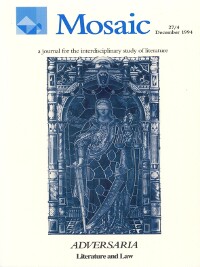Issue 27.4
Overview

Special Issue: Adversaria: Literature and Law
Published: December 1994
View the issue introduction or see the issue summary and contents below.
13 essays, totalling 246 pages
$20.00 CAD
This special issue of Mosaic, guest-edited by Trevor Anderson and Anne McGillivray, contains twelve essays that examine the intersections and representations of literature and law. The essays explore matters of style and rhetoric, fictional and non-fictional representations, and philosophical curiosities about the law and its function. They examine both the law in literary texts, such as Ulysses and Billy Budd, and law books as literature, such as Doctor and Student and the Lawes Resolutions of Womens Rights, as well as philosophical texts and historical cases.
Recherche Sublime: An Introduction to Law and LiteratureAnne McGillivray In an effort to begin a conversation about teaching law and literature, James Boyd White describes his own practice in three courses: “The Legal Imagination,” which explores possibilities for meaningful expression in legal and other languages; “Rhetoric, Law, and Culture,” which engages the student in the simultaneous practice of cultural, esthetic, and ethical criticism; and “Learning Foreign Law,” which explores the intellectual and ethical activity of translation as a model for all human interaction, in the law and out of it. | |
Teaching Law and LiteratureJames Boyd White “Governance” as the daily “conduct of conduct” of every subject in the state “explodes” as a problem in sixteenth century Europe (asserts Michel Foucault). This essay argues that two English law books—Doctor and Student (aimed at men) and The Lawes Resolutions of Womens Rights (aimed at women)—employ literary strategies to operate as tactics of governance. | |
Wit, Will and Governance in Early Modern Legal LiteratureMary Polito Applying the techniques of New Historicism to the materials of legal history, this essay reveals the debate between common law and equity in The Merchant of Venice’s trial scene as a polemical intervention in the conflict between England’s ruling and rising classes for the spoils of the new capitalist economy. | |
"The Quality of Mercy": Law, Equity and Ideology in The Merchant of Venice.Stephen A. Cohen Contemporaries of Margaret Vincent, who murdered her three young children in 1617, called her a “pittilesse mother.” This essay suggests that Vincent’s situation was defined by acute conflict and that her crimes can be understood as a result of contemporary expectations of motherhood. | |
"A Pittilesse Mother"?: Reports of A Seventeenth-Century English FilicideBetty S. Travitsky Johnson found in Blackstone a reformulation of natural-law theory that reflected developments in Hooker, Bacon and Cumberland. The modified theory enabled Johnson to challenge professional boundaries: to infuse his literary writings with legal thought and to offer legal counsel to lawyers with respect to specific problems and cases. | |
Johnson, Blackstone, and the Tradition of Natural LawAlexander M. Forbes The contribution of English Jacobin novelists to the late eighteenth-century discourse on natural and civil rights includes critical analysis of juridical concepts. This essay argues that the Jacobin novel celebrates the emergence of the new citizen defined by a propertied, autonomous self, but it also reveals the exclusion of certain segments of the population from participation in government formed by contract. As such, the novels comprise a crucial component of the history of rights. | |
Rights, Property and the Law in the English Jacobin NovelNancy E. Johnson By analyzing the discursive strategies deployed by men and women in indecent assault depositions, we can describe the ways in which the law appeals to gendered literary conventions in order to determine legitimacy, authority, guilt and innocence in policing sexual practices. | |
Naming Privates in Public: Indecent Assault Depositions, 1830-1860Christine L. Krueger This essay explores the claim that the most instructive visions of the art of judgment are to be found in literary materials. Focusing upon the crises of representation and judgment in Billy Budd, the essay explores the discursive possibilities and limitations of the fledgling dialogue between law and literature. | |
Discursive Limits: Narrative and Judgment in Billy BuddLawrence Douglas While some legal theoreticians enlist reflection in defense of law, others decry the entire theoretical project as either ideological ploy or empty fashion. Through a reading of Franz Kafka’s The Problem of Our Laws, this essay attempts to disclose the fundamental point of theoretical discourse about law: namely, the utopian and tragic possibilities of human association. | |
Kafka, Legal Theorizing and RedemptionFrederick C. DeCoste In lifting the ban on Ulysses, Judge Woolsey articulated a number of “well-intentioned lies” which misrepresent Joyce’s novel and literature in general. They do so, I argue, because they give expression to an esthetic theory of art, one which provides a poor basis for defending freedom of literary speech. | |
Lifting the Ban on Ulysses: The Well-Intentioned Lies of the Woolsey DecisionPaul Vanderham The image of “official law” appears throughout the disparate postcolonial literatures. By focusing on a Canadian paradigm, this essay explores how postcolonial writers return compulsively to the legal rituals by which imperialist justice “sentences” indigenous reality back into the defining configurations of its own authoritarian syntax. | |
"Ratione officii": Representing Law in Postcolonial LiteraturesGary Boire This essay argues that opening statements are constructed as strategic narratives, narratives designed to place lawyers in a relationship of solidarity with the jury and consequently to encourage the jury to align itself either with or against the accused. Examining a pair of model opening statements, the essay employs the structures of narratology and places them within the context of social semiotics and rhetoric. | |
Trial Advocacy Handbooks: Narratology and Opening StatementsJill Tomasson Goodwin This essay argues that opening statements are constructed as strategic narratives, narratives designed to place lawyers in a relationship of solidarity with the jury and consequently to encourage the jury to align itself either with or against the accused |